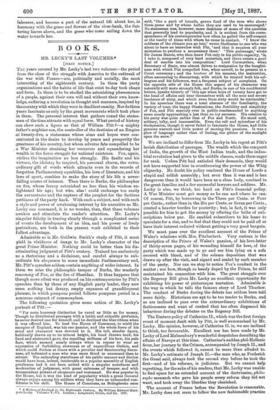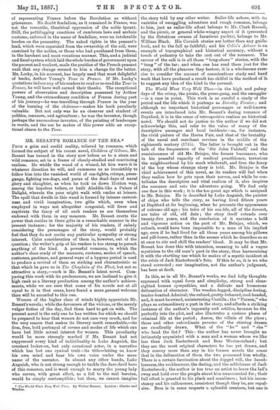BOOKS.
MR. LECKY'S LAST VOLUMES.* [FIRST NOTICE.] Tun years covered by Mr. Lecky's last two volumes—the period from the close of the struggle with America to the outbreak of the war with France—are, politically and socially, the most interesting of the eighteenth century. In them the party organisations and the habits of life that exist to-day took shape and form. In them is to be studied the astonishing phenomenon of a people, against their own will and without their own know- ledge, suffering a revolution in thought and manners, inspired by the country with which they were in deadliest enmity. Nor do these years fascinate us only by the great movements which took place in them. The personal interest that gathers round the states- men of the time attracts with equal force. What period of history -can show such a figure as that of William Pitt ?—a mighty father's mightier son, the controller of the destinies of an Empire at twenty-five, a statesman whose aims and hopes were con- centrated in the desire to develop by peace and prosperity the greatness of his country, but whom adverse fate compelled to be a War Minister straining her resources and squandering her wealth in the fierce struggle for national existence. Fox, again, strikes the imagination no lees strongly. His faults and his virtues, the idolatry he inspired, his personal charm, the extra- ordinary gift of words which attracts even in the records of forgotten Parliamentary squabbles, his love of literature, and his love of sport, combine to make the story of his life a never- failing source of interest. Then there is Burke, the philosopher on fire, whose frenzy astonished no less than his wisdom en- lightened his age ; but who, alas ! could exchange too easily the earnestness and the rapture of the prophet for the factions pettiness of the party hack. With such a subject, and with such a style and power of awakening interest by his narrative as Mr. Lecky can command, it is no wonder, then, that these volumes awaken and stimulate the reader's attention. Mr. Lecky's singular felicity in tracing clearly through a complicated series of events the development of an idea, and his power of lively portraiture, are both in the present work exhibited to their fullest advantage.
Admirable as is Mr. Goldwin Smith's study of Pitt, it must yield in vividness of image to Mr. Lecky's character of the great Prime Minister. Nothing could be better than his dis- criminating judgment of Pitt's oratory. Trained too exclusively as a rhetorican and a declaimer, and careful always to sub- ordinate his eloquence to some immediate Parliamentary end, Mr. Pitt's speeches seldom contain anything of wider interest. In them we miss the philosophic temper of Burke, the masterly reasoning of Fox, or the fire of Sheridan. It thus happens that though more effect was produced on his contemporaries by Pitt's speeches than by those of any English party leader, they now seem nothing but dreary, empty expanses of grandiloquent phrases, in which pompous period follows pompous period in a sonorous cataract of commonplace.
The following quotation gives some notion of Mr. Lecky's portrait of Pitt
For mere honorary distinction he oared aa little as for money. Though he distributed peerages with a lavish and culpable profusion, tie never desired one for himself, and he declined the blue ribbon when it was offered him. To lead the House of Commons, to wield the energies of England, was his one passion, and the whole force of his mind and character was devoted to it. His tall, slender figure, habitually drawn np to its utmost height, his head thrown bank, his fixed and abstracted gaze, the repelling stiffness of his bow, his pale face, which seemed nearly always when in repose to wear an • expression of forbidding sternness or of supercilious disdain, and which could darken at times with a peculiar and domineering fierce- ness, all indicated a man who was more fitted to command than to attract. The unbending stateliness of his public manner and diction would have been, indeed, intolerable to a popular assembly of English gentlemen had it not been united with a singular soundness and moderation of judgment, with great calmness of temper, and with transcendent powers of eloquence and command. He was popular in the House, but it was the kind of popularity which a great General always enjoys among his soldiers when they have an unbounded con- fidence in his skill. The House of Commons, 'as Bolingbroke once • A History of England in the Eighteenth Century. By William Edward Hal-t-
ipple Leaky. Volumes London : Longman.% Green, and Co. 1887.
said, like a pack of hounds, grows fond of the man who shows them game and by whose halloo they are need to be encouraged.' No statesman was, however, more destitute of some of the qualities that generally lead to popularity, and it is evident from the corre- spondence of his contemporaries how often be galled the self-respect
or the vanity of those with whom he came in contact. know the coldness of the climate yea go into,' wrote Shelburne to one who was about to have an interview with Pitt, and that it requires all your animation to produce a momentary thaw.' This personage,' wrote Sir James Harris, who then knew Pitt only in his publio capacity, 'is, I take it, composed of very hard materials, and there enters a good deal of marble into his composition.' Lord Carmarthen, when Secretary of State, was almost driven to resignation by the htughti- nese with which Pitt compelled him, when unwell, to be present at a Court ceremony ; and the hauteur of his manner, the inattention, often amounting to discourtesy, with which he treated both his col- leagues and his followers, was a frequent subject of oomplaint. On the opposite aide of the House this aspect of his character was naturally still more strongly felt, and Burke, in one of his confidential letters, speaks bitterly of this age when boys of twenty have got to the head of affairs and bear themselves with all the sour and severe insolence of sixty, and which even from sixty would be intolerable.' In his speeches there was a total absence of the familiarity, the variety of tone, the happy illustrations, the flexibility and simplicity of Fox, and Pitt scarcely ever in public condescended to anything more nearly approaching a jest than an icy sarcasm. His relation to his party was quite unlike that of Fox and North. He stood cold, solitary, lofty, and inaccessible. Even the roll and splendour of his declamation, though it never failed to fascinate the House, had little genuine warmth and little power of moving the passions. It was a glow of language rather than of feeling, the glitter of the sunlight upon the snow."
We are inclined to differ from Mr. Lecky in his regret at Pitt's lavish distribution of peerages. The wealth which the conquest of India, the growth of the West Indian trade, and the indus- trial revolution had given to the middle classes, made them eager for rank. Unless Pitt had satisfied their demands, they would not have supported him in overthrowing the power of the Whig oligarchy. No doubt his policy rendered the House of Lords a stupid and selfish assembly ; but even thus it was and is less dangerous than it would have been as a close body, confined to the great families and a few successful lawyers and soldiers. Mr. Lecky is also, we think, too hard on Pitt's financial policy. A War Minister must get money as he can and where he can. Of course, Pitt, by borrowing in the Three per Cents. or Four per Cents., rather than in the Six per Cents. or Seven per Cents., created a heavier burden for posterity ; but, in fact, it was only possible for him to get the money by offering the bribe of sub. scriptions below par. He enabled subscribers to his loans to speculate for a rise, and to feel that they could not be paid off or have their interest reduced without getting a very good bargain.
We must pass over the excellent account of the Prince of Wales's relations with Mrs. Fitzherbert. Very curious is the description of the Prince of Wales's passion, of his love-letter of thirty-seven pages, of his wounding himself for love, of the party which was made up to go and see him lying on a sofa covered with blood, and of the solemn deposition that was drawn up after the visit, and signed and sealed by each member of the party. Nor can we stop to notice Fox's conduct in the matter ; nor how, though so basely duped by the Prince, he still maintained his connection with him. The great struggle over the Regency Bill gives Mr. Lecky an excellent opportunity for exhibiting his power of picturesque narration. Admirable is the way in which he tells the famous story of Lord -Thurlow. The conduct of Burke during the debate has seldom been told more fairly. Historians are apt to be too tender to Burke, and so are inclined to pass over the extraordinary exhibitions of factiousness and want of control that too often disgraced his behaviour during the debates on the Regency Bill.
The Eastern policy of Catherine IL, which was the first foreign event of moment dealt with by Pitt, is well summarised by Mr. Lecky. His opinion, however, of Catherine II. is, we are inclined to think, too favourable. Excellent use has been made by Mr. Lecky of Lord Malmesbury's wonderful despatches describing the affairs of Europe at this time. Catherine's sudden Phil-Hellenic fever, her journey to the Crimea, accompanied by Joseph IL, and the events which followed it, cannot be more than alluded to. Mr. Lecky's estimate of Joseph IL—the man who, as Frederick the Great said, always took the second step before he took the first—and of his reforms, is judicious. But we cannot help regretting, for the sake of his readers, that Mr. Lecky was unable to find space for an extended account of the doctrinaire, philo- sophe monarch who gave his people every reform they did not want, and took away the liberties they cherished.
The account of France before the Revolution is reasonable. Mr. Lecky does not seem to follow the now fashionable practice
of representing France before the Revolution as without grievances. No doubt feudalism, as it remained in France, was not. the romantic, theatrical oppression of the noble tyrant. Still, the pettifogging exactions of cumbrous laws and archaic customs, enforced in the name of feudalism, were an intolerable burden on the peasantry. The naked rights in the peanut's land, which were separated from the ownership of the soil, were exercised by the nobles, or those who had purchased from them, in the harshest and most vexatious manner. This, and a judicial and fiscal system which laid the whole burdenof government upon the poorest and weakest, made the position of the French peasant such that any change seemed to him a change for the better. M1. Lecky, in his account, has largely need that most delightful of books, Arthur Young's Tour in France. If Mr. Lecicy's quotations induce any of his readers to read or re-read the Tour in France, he will have well earned their thanks. The exceptional powers of observation and description possessed by Arthur Young, and the extraordinary condition of France during part of his journey—he was travelling through France in the year of the burning of the chdteaux—makes his book peculiarly. valuable. But not only was he an observer and student of politics, manners, and agriculture ; he was the inventor, though perhaps the unconscious inventor, of the painting of landscapes in words, and the use he makes of this power adds an excep- tional charm to the Tour.



















































 Previous page
Previous page